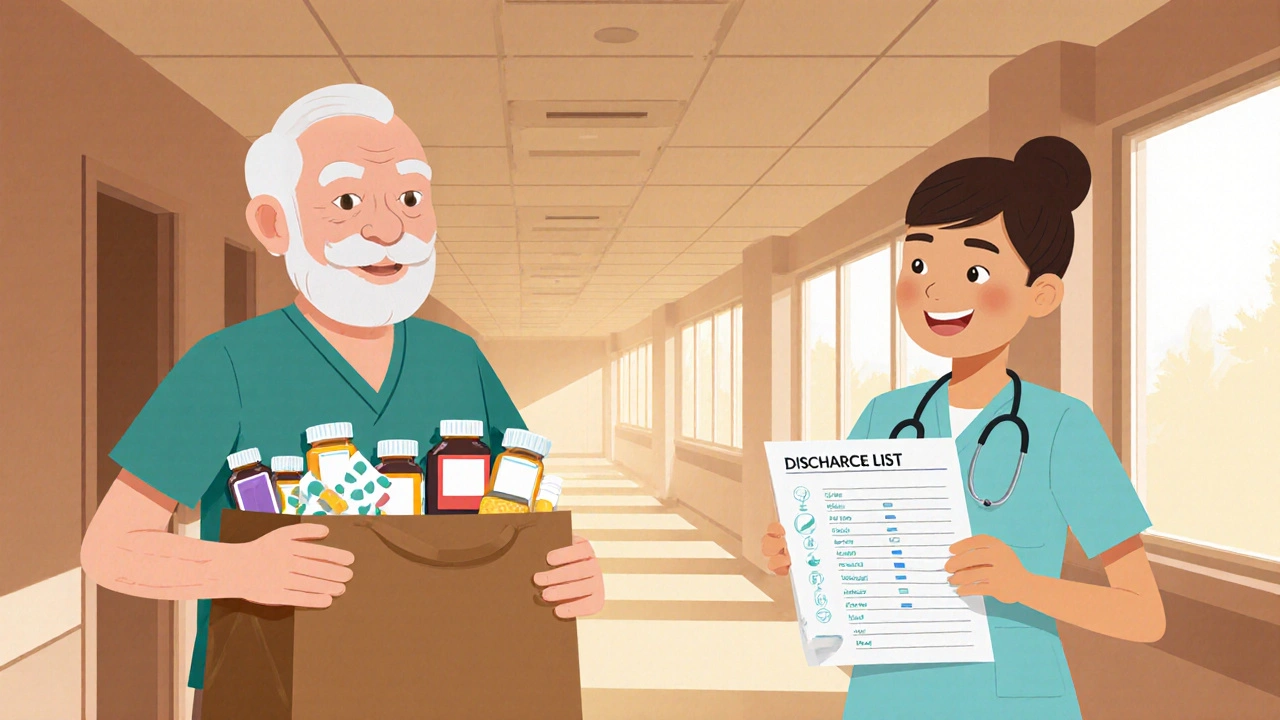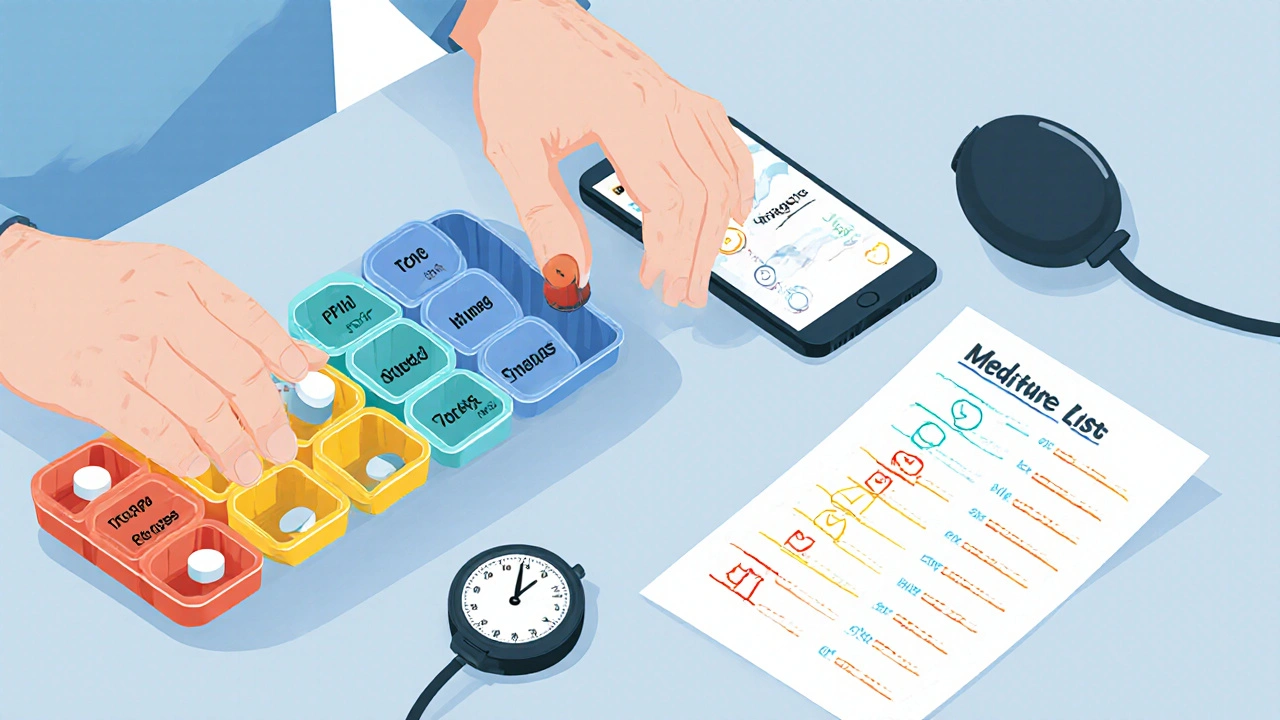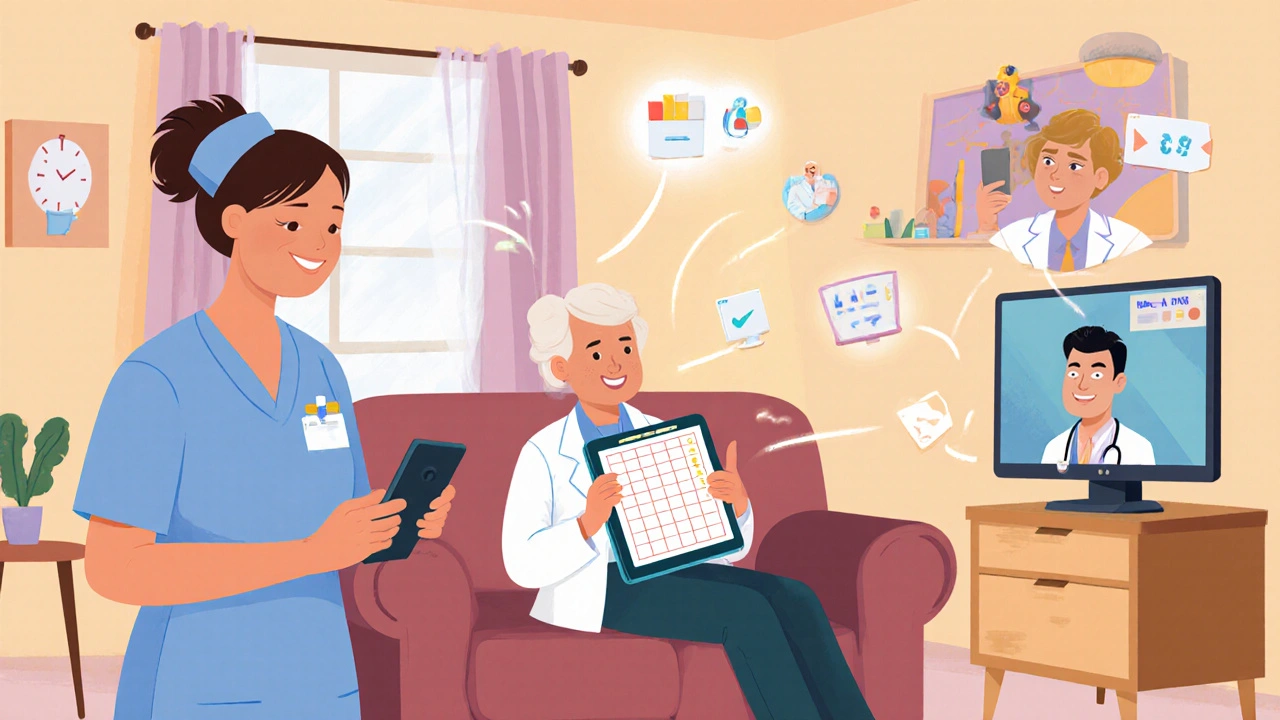
Leaving the hospital after a stay can feel like a victory-until you get home and realize you’re not sure what pills to take, when, or why. For older adults managing five, six, or even ten different medications, this moment is one of the most dangerous in the entire healthcare journey. About 1 in 5 seniors experience a medication error within three weeks of leaving the hospital, according to research from the Journal of General Internal Medicine. Many of these errors are preventable. And they’re not just inconvenient-they can land you back in the hospital, sometimes with life-threatening consequences.
Why Medication Errors Happen at Discharge
Medication errors don’t happen because someone forgot to write down a dose. They happen because the system is broken. Hospitals track your meds in one system. Your doctor’s office uses another. Your pharmacy has its own records. And if you’re taking over-the-counter pills, herbal supplements, or patches you picked up without a prescription? Those often don’t make it into any system at all. The Joint Commission calls this gap a “medication discrepancy.” In fact, studies show that even when hospitals say they’ve done “reconciliation,” 76% of discharge summaries still contain clinically significant errors when checked by an independent pharmacist. That’s not a mistake-it’s a system failure. Older adults are especially at risk. As we age, our kidneys and liver process drugs differently. We’re more likely to be on blood thinners like warfarin, insulin for diabetes, or opioids for pain-all of which can cause serious harm if dosed wrong. And if you’re confused, forgetful, or hearing-impaired, understanding your new meds becomes even harder.The Core Solution: Medication Reconciliation
The single most powerful tool to stop these errors is medication reconciliation. This isn’t just a checklist. It’s a process that compares every medication you were taking before you went in, what you got in the hospital, and what you’re supposed to take when you go home. The best programs do this in three key moments:- When you’re admitted-within two hours
- When you move between hospital units-within one hour
- When you’re discharged-before you leave
- All prescription drugs
- All over-the-counter pills (like ibuprofen or antacids)
- Herbal supplements (like fish oil, ginkgo, or St. John’s wort)
- Patches, inhalers, eye drops, injections
What Your Discharge Medication List Should Include
A good discharge list doesn’t just say “take lisinopril.” It tells you why you’re taking it. For seniors, this clarity is life-changing. Your list should have:- Drug name (brand and generic)
- Dose (e.g., 10 mg, not “one pill”)
- Frequency (e.g., “once daily at bedtime”)
- Purpose (e.g., “for high blood pressure,” “to prevent stroke”)
- Start date (was this new or changed?)
- Stop date (which meds were discontinued?)
The Teach-Back Method: Make Sure You Understand
Doctors and nurses often assume you understand your meds because you nodded along. But studies show that’s not reliable. The Teach-Back method changes that. Here’s how it works: after your discharge nurse explains your meds, they ask you: “Can you tell me in your own words how you’ll take your new pills?” If you say, “I think I take the blue one in the morning and the white one at night,” that’s not good enough. They’ll ask again-until you can say: “I take the 10 mg lisinopril every morning with breakfast for my blood pressure. I stopped the furosemide because my doctor said it wasn’t needed anymore.” This simple technique improves medication adherence by 32%, according to Patient Education and Counseling. It’s not about testing your memory-it’s about making sure the information stuck.
Who Should Be Involved in Your Transition
You shouldn’t have to do this alone. The most successful transitions involve a team:- Pharmacist: Leads medication reconciliation, catches interactions, explains why meds were added or stopped.
- Nurse: Coordinates discharge timing, ensures you get your prescriptions filled, confirms follow-up appointments.
- Transition coach: Calls you within 24 hours of going home, checks if you have your meds, answers questions, connects you to home care.
- Primary care doctor: Should receive your updated med list before you leave the hospital-and confirm it with you within 7 days.
What to Do Before You Leave the Hospital
Don’t wait until you’re home to figure this out. Take action before discharge:- Bring a list of every medication you take at home-including vitamins, supplements, and creams. Use the “brown bag” method: put everything in a bag and bring it to the hospital.
- Ask: “Which of my old meds have I stopped? Which are new? Why?” Write it down.
- Get a printed copy of your discharge medication list. Don’t rely on an email or a text.
- Ask: “Who will call me after I go home? When?”
- Confirm: “Will my pharmacy get this list? Will my doctor get it?”
What to Do in the First 7 Days at Home
The first week after discharge is the most dangerous. Half of all medication errors happen here.- Take your meds exactly as written-no guessing.
- Use a pill organizer. Don’t rely on memory.
- Check your blood pressure, blood sugar, or INR levels if you’re on warfarin or insulin. Keep a log.
- If you feel dizzy, nauseous, confused, or have unusual bruising-call your doctor or pharmacist immediately. Don’t wait.
- Attend your follow-up appointment within 7 days. If you don’t have one scheduled, call your doctor’s office right away.

Red Flags That Something’s Wrong
Watch for these warning signs:- You’re taking a pill you don’t remember being prescribed
- You’re told to stop a medication that was helping you
- You’re given a new dose that’s much higher or lower than before
- You’re not told why a new pill was added
- Your pharmacist says your prescription doesn’t match your doctor’s order
What If You Can’t Afford Your Meds?
Cost is a hidden cause of medication errors. If you can’t afford your prescriptions, you might skip doses, split pills, or stop taking them altogether. That’s dangerous. Ask your pharmacist or discharge nurse about:- Generic alternatives
- Manufacturer assistance programs
- Medicare Part D Extra Help
- Local nonprofit pharmacy aid programs
Final Thought: You Are the Most Important Part of This System
No matter how good the hospital’s system is, if you don’t understand your meds, you’re still at risk. You are not a passive recipient of care-you’re the quarterback of your own health. Keep your med list updated. Ask questions. Say no to vague answers. Bring your pills to every appointment. Use your phone to set reminders. Tell someone you trust what you’re taking. The goal isn’t just to leave the hospital. It’s to come home-and stay well.What’s the most common medication error after hospital discharge?
The most common error is a mismatch between what the hospital says you should take and what you were actually taking at home. This includes missing over-the-counter drugs, herbal supplements, or incorrect doses. Studies show nearly 80% of discharge lists have at least one error when checked independently.
Should I bring my medications to the hospital when I’m admitted?
Yes. Bring all your medications-including pills, patches, inhalers, eye drops, and supplements-in their original bottles. This is called the “brown bag” method. It helps the hospital staff see exactly what you’re taking, not just what’s written on paper. It’s one of the most effective ways to prevent errors.
Can a pharmacist help me after I leave the hospital?
Absolutely. Pharmacists are medication experts and are trained to spot dangerous interactions, incorrect doses, and unnecessary drugs. Many hospitals now have discharge pharmacists who review your list before you leave. Even if they don’t, your community pharmacist can review your new prescriptions and compare them to your old ones for free.
How soon should I see my doctor after being discharged?
If you’re high-risk-taking five or more medications, have heart failure, COPD, or kidney disease-you should see your doctor within 7 days. For most others, 14 days is acceptable. But don’t wait for them to call you. Call them. If you can’t get in, ask for a telehealth visit.
What if I can’t read or understand my discharge instructions?
Ask for help. Request large-print copies, audio instructions, or a family member to be present during discharge planning. You have the right to understand your care. If the hospital won’t help, ask to speak with a patient advocate. Many hospitals have them. And remember: the Teach-Back method is your tool-ask them to explain it again until you can say it back correctly.
Are there tools or apps that can help me manage my meds at home?
Yes. Simple tools like a pill organizer with alarms, a smartphone calendar with reminders, or apps like Medisafe or MyTherapy can reduce errors by up to 40%. Some hospitals even provide free apps for patients transitioning home. Ask your discharge team if they have one to recommend.




Aaron Whong
November 19, 2025 AT 19:43The systemic fragmentation of pharmacovigilance infrastructure post-discharge represents a critical epistemic rupture in the continuum of care. The ontological disjunction between EHR silos, pharmacy databases, and patient-reported adherence metrics creates a topological space where iatrogenic harm proliferates unchecked. The reconciliation protocol, while ostensibly robust, remains a performative artifact unless ontologically grounded in patient phenomenology-i.e., the lived experience of polypharmacy as a hermeneutic burden. Without epistemic humility from clinicians, we're merely automating the illusion of safety.
Sanjay Menon
November 19, 2025 AT 19:48Oh please. Another sanctimonious manifesto on ‘medication reconciliation’ like it’s some revolutionary breakthrough. The entire healthcare system is a circus. Pharmacists? Please. They’re just glorified cashiers with a white coat. And don’t get me started on ‘teach-back’-like patients are schoolchildren who need to recite their meds like a prayer. I’ve seen this exact post three times this month. Boring. Predictable. Overwrought. Also, who the hell writes like this? Did you take a course in ‘How to Sound Important While Saying Nothing’?
Marissa Coratti
November 19, 2025 AT 22:21Thank you for this meticulously detailed and profoundly necessary guide. I cannot emphasize enough how vital it is that we institutionalize pharmacist-led reconciliation as a non-negotiable standard of care-not an optional add-on, but a foundational pillar of discharge planning. The data is unequivocal: when trained clinical pharmacists engage directly with patients during the transition phase, adverse drug events decrease by up to 20%, and hospital readmissions plummet. Yet, despite Medicare reimbursement for Transition Care Management, fewer than 37% of hospitals consistently deploy this service. We must advocate, we must demand, we must hold administrators accountable. This is not merely a clinical protocol-it is a moral imperative. Every senior who returns home confused, overwhelmed, or misinformed about their regimen is a failure of our collective duty of care. Let us not normalize this negligence.
Amanda Wong
November 20, 2025 AT 16:12Let’s be clear: the ‘brown bag’ method is a Band-Aid on a severed artery. You think bringing your pills to the hospital solves anything? It doesn’t. Most nurses don’t even open the bag. They just glance at the labels and assume the patient knows what they’re taking. And ‘teach-back’? That’s just a way for overworked staff to feel like they did their job without actually ensuring comprehension. The real problem? No one is held responsible when the discharge summary is wrong. No penalties. No audits. No consequences. Until someone gets fired for a fatal medication error, this will keep happening. And you? You’re just writing another feel-good article that makes people feel like they’ve done something. They haven’t.
Kaushik Das
November 21, 2025 AT 05:08Bro, this hit different. I’ve seen my aunt go through this-she came home with six new pills, three old ones pulled without explanation, and zero clarity. One day she took her blood pressure med with grapefruit juice because the label said ‘take daily’-no time, no warning. She ended up in ER. This post? It’s like someone finally wrote the manual we all needed but never got. The part about pharmacists being the unsung heroes? 100% true. My local pharmacy guy caught a deadly interaction between her new anticoagulant and that ‘natural’ turmeric supplement she swore was harmless. He didn’t charge a dime. That’s the kind of care we need-real people, not just systems. If you’re reading this and you’re a caregiver? Do the brown bag. Bring the list. Ask the ‘why’ until your throat hurts. They’re not gonna do it for you.
Cynthia Springer
November 21, 2025 AT 07:45Is it just me, or does anyone else feel like the ‘Teach-Back’ method is more about protecting the hospital from liability than actually helping the patient? I’ve been in rooms where the nurse asks, ‘Can you tell me how you’ll take your meds?’ and if you hesitate, they just move on. No follow-up. No patience. No rephrasing. It’s performative. And yet, the article treats it like a silver bullet. I’m not saying it doesn’t work-I’m saying it’s rarely done right. Who’s training the trainers? Who’s auditing whether it’s actually improving outcomes, or just ticking a box? I need more than hope. I need data.
Rachel Whip
November 23, 2025 AT 03:10For anyone reading this who’s overwhelmed: start small. Get a pill organizer with compartments for morning/afternoon/evening. Set phone alarms labeled with the drug name and purpose-‘Lisinopril: BP’ not ‘Blue pill’. Print your med list and tape it to the fridge. Call your pharmacist before you leave the hospital and ask them to review your list. They’re legally required to help you. If they say no, ask for a supervisor. You are not asking too much. You’re asking for your life. And if you can’t afford your meds? Say it out loud. ‘I can’t afford this.’ That’s not weakness-it’s the first step to getting help. There are programs. They exist. You just have to ask. And if you’re scared? Bring someone with you. You don’t have to do this alone.
Ezequiel adrian
November 23, 2025 AT 05:58Y’all are overthinking this. Just take the damn pills like the paper says. If you don’t know what they are, ask the pharmacist. If you’re confused, call your doctor. Simple. No drama. No philosophy. No ‘brown bag’ theatrics. I’ve seen old folks in Nigeria manage 8 meds with a chalkboard and a cousin who checks in daily. We don’t need apps or coaches. We need someone who cares enough to show up. And if your hospital won’t give you a clear list? Don’t leave until you get one. Period. 🤷♂️